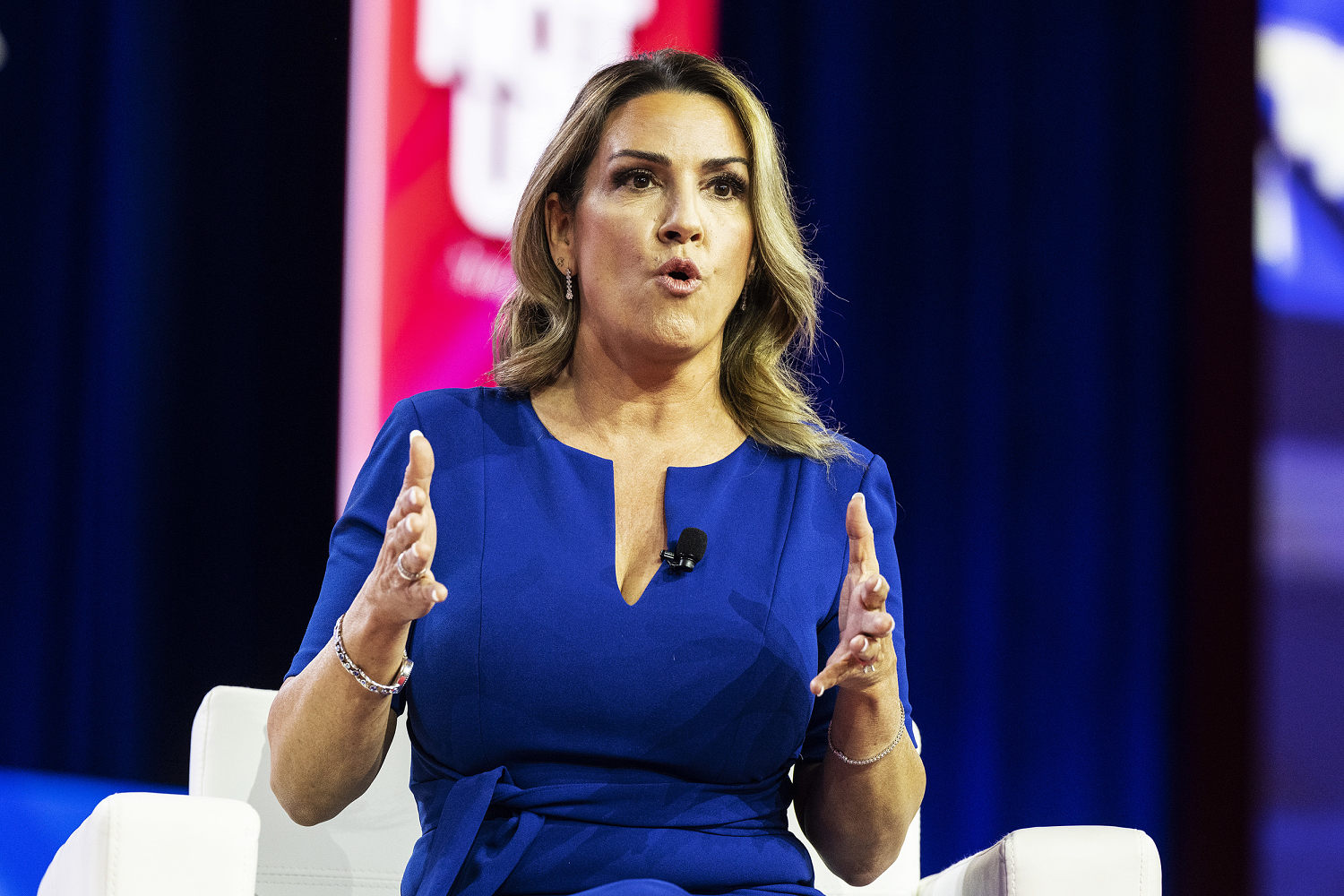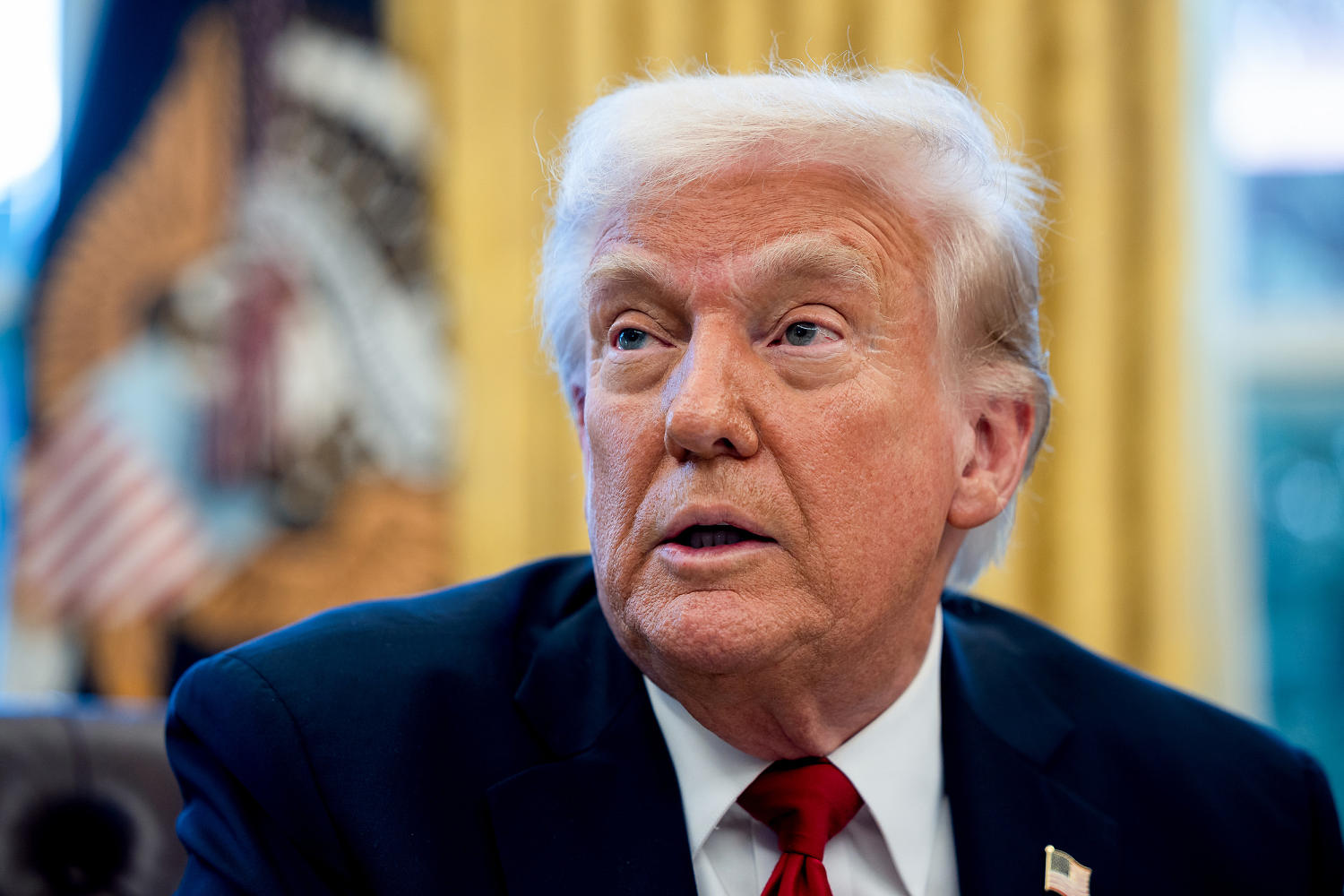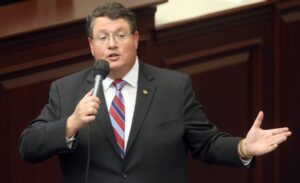The Dictatorship
Despair and fury in Gaza are fueling a remarkable movement against Hamas

After three days of public protests in northern Gaza against Hamasthe organization’s political grip there seems to be fraying. Each of the protests have involved hundreds of Palestinians and they reflect a clear understanding that Hamas, and not just Israelis responsible for their plight. It could be a turning point, but much depends on how outside powers respond.
Public criticism of Hamas in Gaza is hardly, as Israeli Prime Minister Benjamin Netanyahu claims, unheard of. Even during the war launched by Israel after the Hamas-led Oct. 7, 2023, attack on southern Israel, smaller and more sporadic protests periodically erupted.
Frustration with Hamas among ordinary Gazans is boiling over.
What differentiates the recent protests is their size and continuity. In the last three days, thousands of Palestinians gathered to urge Hamas to relinquish power, release hostages and help stop Israel’s relentless attacks that the Palestinian Health Ministry reports have cost over 50,000 Palestinian lives (the majority of them civilian). Netanyahu is wrong to cynically and dishonestly cite the protests as evidence that Israel’s policies are “working.” But Hamas is wrong in claiming they are manufactured and directed by “outside forces,” rather than the spontaneous expression of richly deserved outrage.
I have repeatedly opined that Palestinians should never forgive Hamas for deliberately provoking Israel into an extreme overreaction. Israeli policy has always rested on disproportionate retaliation. The intensity of Israel’s violence in Gaza is as predictable as it is appalling. Palestinians understand this intimately.
There’s ample outrage against Israel’s war on Gazan society in general, which is hardly limited to just Hamas. Many scholars and historians on genocide, including a number of Israelishave argued that the word reasonably applies to the Israeli military’s use of food, medicine, water and routine displacement as weapons of war against civilians.
And still, frustration with Hamas among ordinary Gazans is boiling over. The protests are predictably centered in Gaza’s north, the first areas decimated after Oct. 7, and where the most extreme violence and denial of basic necessities have been focused.
Contrary to Netanyahu’s claims, these protests are taking place despite Israel’s ongoing brutality, not because of it. A poll released on Oct. 6, 2023, the eve of the attack against southern Israel, by the Arab Barometerfound just 29% of Palestinians in Gaza had any favorable attitudes toward Hamas. Today, it may be even lower.
The protesters have no illusions about Israel. Virtually all interviewed by Arab and Western media made their fury at Israel’s brutality crystal clear.
Hamas did not care about the fate of the over 2 million Palestinian civilians it conscripted for “martyrdom” without the least consultation, warning or preparation. It also doesn’t much care about the ebb and flow of public opinion. It retains a base of public support, and much of the population will continue to understandably focus their rage against Israel, at least until the IDF is finally gone from Gaza. But despair and fury have fueled these unusually large and sustained protests against Hamas and its evident share of responsibility.
Hamas did not care about the fate of the over 2 million Palestinian civilians it conscripted for ‘martyrdom’ without consultation, warning or preparation.
For outsiders who are sincerely interested in seeing the end of Hamas power in Gaza, these protests represent a significant opportunity. It’s by no means clear Netanyahu is genuinely among them, after decades of consistently ensuring that the Palestinians remain divided between Islamist rule in Gaza and secular nationalist control in the small self-ruled areas of the West Bank. Predictably, he’s doing his best to damage and undermine the credibility of the protests and their political potential by framing them as evidence of the wisdom of Israel’s scorched-earth policy.
However, it behooves constructive-minded Arab states like Egypt, Saudi Arabia and the UAE to cautiously but deliberately do whatever they can to support protest leaders and organizers. They could well provide crucial elements of an alternative Palestinian civic authority in Gaza to assume governance responsibility — instead of both Israeli occupation and Hamas.
Surviving business interests, clan leaders and remaining Fatah cadres in Gaza are surely either intimately connected to the protest movement and its organizers or should become so, no matter how spontaneous the demonstrations have been. There is certainly significant coordination taking place given how large, widespread and sustained they have been.
Israel should remain silent about the protests for its own political purposes and resume the ceasefire. Leading Arab states should step up and take the initiative, and the U.S. and Western countries should recognize that the protests demonstrate that the Egyptian-coordinated Arab League plan for finally halting the madness and initiating reconstruction in Gaza is viable and, indeed, the only real framework that can bring an end to both the war and Hamas rule in Gaza.
The protesters are bravely demonstrating that thousands of patriotic Palestinians in Gaza sincerely want the war (as they typically say, “the genocide”) to end, the remaining Israeli hostages to be released and Hamas to step down.
It’s exactly what Arab states, Western countries and even the Israelis say they want. There is no longer any basis for contending there is nothing to work with practically and politically among the Palestinians of Gaza. Obviously, there’s plenty, if anyone is genuinely interested.
Hussein Ibish is a senior resident scholar at the Arab Gulf States Institute in Washington.
The Dictatorship
With his choice for drug czar, Trump adds to his team of Fox-affiliated amateurs

Nearly eight years ago, Donald Trump nominated Republican Rep. Tom Marino of Pennsylvania to lead the Office of National Drug Control Policy — a position best known to the public as the nation’s “drug czar.” That did not turn out well.
Following explosive reporting from The Washington Post, which found that the GOP congressman championed legislation that hindered federal agents from going after the Big Pharma firms that flooded the country with addictive opioids, Marino’s nomination collapsed and he withdrew from consideration.
Eight years later, the president has a new drug czar in mind, who’s notable for different kinds of reasons. The Washington Post reported:
President Donald Trump said on Friday that he intends to nominate Sara A. Carter, a Fox News contributor, to serve as director of the White House Office of National Drug Control Policy. “From Afghanistan to our Border, Sarah’s relentless pursuit of Justice, especially in tackling the Fentanyl and Opioid Crisis, has exposed terrorists, drug lords, and sex traffickers,” Trump wrote on his social media platform, Truth Social, misspelling her first name.
One of the reasons the Carter nomination stood out is the growing list of Fox News personalities who’ve landed powerful positions on Team Trump. In January, The New York Times published a tally and found 19 “former Fox News hosts, commentators, on-air medical experts, producers and other personnel” who’d landed jobs in the Republican administration. Soon after, Media Matters published a revised totalputting the new number at 20. (The list did not include Attorney General Pam Bondi, who briefly moonlit as a guest host of a Fox News program while she was serving as Florida’s chief law enforcement official.)
As March got underway, the president also appointed Fox News personalities Laura Ingraham and Maria Bartiromo to the Kennedy Center board, and as March neared its end, Trump added yet another Fox News contributor to his White House operation, tapping Carter to serve as the drug czar.
But complicating matters is the nominee’s resume. As a Stat News report explained, “Carter’s selection comes as a surprise: Her background is not in drug policy, public health, or law enforcement, and she has never served in government.”
Or put another way, Carter will be an amateur, joining Trump’s team of amateurs.
It is not exactly a secret that the incumbent president sees governing expertise and policymaking experience as qualities to be avoided. Indeed, during the Republican’s first term, those with expertise and experience tended to be the people who discouraged the president — the first chief executive in American history to reach the Oval Office without any experience in public office at any level — from taking steps he was eager to take.
As a result, Trump appears to have gone out of his way to lean into his preference for amateurs in a second term, choosing inexperienced and unqualified loyalists for much of the White House Cabinet.
Those who celebrate rookies in positions of influence have reason to celebrate. Those who value qualifications have reason to worry.
Steve Benen is a producer for “The Rachel Maddow Show,” the editor of MaddowBlog and an BLN political contributor. He’s also the bestselling author of “Ministry of Truth: Democracy, Reality, and the Republicans’ War on the Recent Past.”
The Dictatorship
Trump says he ‘couldn’t care less’ if some automakers raise prices due to tariffs

The Wall Street Journal reported that Donald Trump recently spoke to some of the top U.S. automakers, and as part of the private chat, he issued a warning: The president told them not to raise prices in response to the White House’s tariffs policy.
The report, which has not been independently verified by BLN or NBC News, added that the Republican told the executives “that the White House would look unfavorably on such a move, leaving some of them rattled and worried they would face punishment if they increased prices, people with knowledge of the call said.”
Of course, this was more than just the latest example of heavy-handed White House tactics toward ostensible private-sector allies. There was also an unstated subtext to the president’s message to the domestic automakers: Trump seemed to realize that his policy on tariffs would push the manufacturers to raise prices. He apparently hoped to convince them otherwise.
Two days after the Journal’s report reached the public, the president spoke to NBC News about this and other issues, and he denied the accuracy of the account — or at least tried to.
The president said he “couldn’t care less” if automakers raised prices after he announced he would impose 25% tariffs on all foreign-made automobiles. When pressed if he told CEOs not to raise prices, as reported in the Wall Street Journal, Trump added, “No, I never said that. I couldn’t care less if they raise prices, because people are going to start buying American-made cars.”
Trump continued, “I couldn’t care less. I hope they raise their prices, because if they do, people are gonna buy American-made cars.”
In context, the Republican was apparently trying to argue that he “hopes” to see foreign auto manufacturers raise prices on their vehicles so that consumers would shift their focus to domestic auto manufacturers.
But it’s not quite that simple. Whether Trump’s tariffs would raise prices on domestic manufacturers — many American cars and trucks are made with parts that are imported from other countries — is a detail the White House does not appear to have grappled with.
What’s more, U.S. manufacturers who sell vehicles abroad will have to contend with a series of reciprocal tariffs imposed by other countries.
With this in mind, if the president assumes that U.S. companies are on board with his approach, there’s evidence to the contrary. In fact, it was just last month when Ford Motor CEO Jim Farley spoke at a conference and said the Trump administration’s trade policies were generating “a lot of chaos“ for the industry.
As part of the same remarks, the Ford executive also warned that some of the White House’s plans for trade tariffs would be “devastating” to auto manufacturers and “blow a hole in the U.S. industry that we’ve never seen.”
It might seem like ancient history, but it was just last year when Trump told voters“When I win, I will immediately bring prices down starting on day one.” This is not a cherry-picked quote that he accidentally blurted out once and then quickly forgot. On the contrary, the then-candidate repeated the line over and over again as Election Day approached, assuring Americans that he’d help lower prices immediately after returning to the White House.
It’s hard not to wonder how voters who believed his promises feel after hearing Trump say he “couldn’t care less” if some automakers raise prices.
Steve Benen is a producer for “The Rachel Maddow Show,” the editor of MaddowBlog and an BLN political contributor. He’s also the bestselling author of “Ministry of Truth: Democracy, Reality, and the Republicans’ War on the Recent Past.”
The Dictatorship
Despite the Constitution, Trump says he’s ‘not joking’ about eyeing a third term

Over the course of the last decade or so, Donald Trump has demonstrated an affinity for laying rhetorical groundwork for some of his most radical tactics. Ahead of the 2020 election, for example, the president prepared to reject a possible defeat, so he spent months telling the public that the electoral process was illegitimate. Ahead of his many criminal indictments, he similarly invested time and energy into delegitimizing the legal process.
This strategy came to mind anew upon hearing the Republican talk about possibly pursuing a third term in the White House. NBC News reported:
President Donald Trump did not rule out the possibility of seeking a third term in the White House, which is prohibited by the Constitution under the 22nd Amendment, saying in an exclusive interview with NBC News that there were methods for doing so and clarifying that he was “not joking.” … “A lot of people want me to do it,” Trump said in a Sunday-morning phone call with NBC News, referring to his allies.
To be sure, the president’s comments on the subject came with some caveats — or at least comments that seemed like caveats. Trump said, for example, that it’s “far too early” to make any decisions about his electoral future. He similarly added that it’s “very early” in his second term.
But those comments didn’t negate the apparent fact that the incumbent, who is prohibited under the U.S. Constitution from seeking a third term — the 22nd Amendment says, “No person shall be elected to the office of the President more than twice” — is open to the possibility of at least trying to pursue a third term.
In fact, in his interview with NBC News, Trump was hardly subtle. “I’m not joking,” he said, adding that there are “methods” in which he could pursue such a goal.
NBC News asked about a possible scenario in which Vice President JD Vance would run for office and then pass the role to Trump. Trump responded that “that’s one” method. “But there are others, too,” Trump added. Asked to share another method, Trump simply responded “no.”
Hours after the NBC News report reached the public, the president chatted with reporters aboard Air Force One and dodged a series of questions on the topic, though he claimed that “people” have asked him to run for a third term — which he said would be a fourth term “in a way” because his 2020 race was “totally rigged.” (It was not rigged; he lost fair and square, and he’s been lying uncontrollably about this for more than four years.)
If this broader rhetorical push sounds at all familiar, it’s not your imagination. Trump talked about pursuing a third term earlier this month. And last month. And the month before that. And the month before that. In fact, as regular readers might recall, Trump made a series of public comments about a third term during his first term.
What’s more, a variety of White House allies, most notably media personality Steve Bannon, appear to be quite enthusiastic about what they perceive as a possibility — which, again, is not a possibility.
I won’t pretend to know where this is headed or the degree to which the president is prepared to defy constitutional law. But Scott Cummings, a professor of legal ethics at the UCLA School of Law, made a comment on “The Rachel Maddow Show” on Friday that stood out for me.
Commenting on autocracies around the world that have consolidated power, Cummings noted that in none of these countries “do leaders do all the things that Trump is doing, take aim at all of these independent institutions, and then just walk away.” Rather, the professor added, authoritarians take these steps because they intend “to stay in power permanently.”
Steve Benen is a producer for “The Rachel Maddow Show,” the editor of MaddowBlog and an BLN political contributor. He’s also the bestselling author of “Ministry of Truth: Democracy, Reality, and the Republicans’ War on the Recent Past.”
-

 The Josh Fourrier Show5 months ago
The Josh Fourrier Show5 months agoDOOMSDAY: Trump won, now what?
-
Uncategorized5 months ago
Bob Good to step down as Freedom Caucus chair this week
-

 Politics5 months ago
Politics5 months agoWhat 7 political experts will be watching at Tuesday’s debate
-
Uncategorized5 months ago
Johnson plans to bring House GOP short-term spending measure to House floor Wednesday
-
Economy5 months ago
Fed moves to protect weakening job market with bold rate cut
-

 Politics5 months ago
Politics5 months agoHow Republicans could foil Harris’ Supreme Court plans if she’s elected
-
Economy5 months ago
It’s still the economy: What TV ads tell us about each campaign’s closing message
-

 Politics5 months ago
Politics5 months agoRFK Jr.’s bid to take himself off swing state ballots may scramble mail-in voting







